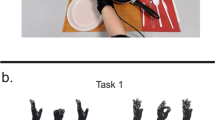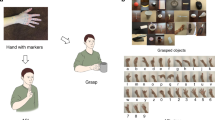Abstract
In this paper, we first review our previous work in the domain of dextrous manipulation, where we introduced Manipulation Manifolds – a highly structured manifold representation of hand postures which lends itself to simple and robust manipulation control schemes.
Coming from this scenario, we then present our idea of how this generative system can be naturally extended to the recognition and segmentation of the represented movements providing the core representation for a combined system for action production and recognition.
Preview
Unable to display preview. Download preview PDF.
Similar content being viewed by others
References
Bitzer, S., Havoutis, I., Vijayakumar, S.: Synthesising Novel Movements through Latent Space Modulation of Scalable Control Policies. In: Asada, M., Hallam, J.C.T., Meyer, J.-A., Tani, J. (eds.) SAB 2008. LNCS (LNAI), vol. 5040, pp. 199–209. Springer, Heidelberg (2008)
Jolliffe, I.T.: Principal Component Analysis, 2nd edn. Springer, New York (2002)
Klanke, S.: Learning Manifolds with the Parametrized Self-Organizing Map and Unsupervised Kernel Regression. PhD thesis, Bielefeld University (2007)
Lawrence, N.: Probabilistic Non-linear Principal Component Analysis with Gaussian Process Latent Variable Models. Machine Learning Research 6 (2005)
Meinicke, P., Klanke, S., Memisevic, R., Ritter, H.: Principal Surfaces from Unsupervised Kernel Regression. IEEE Trans. PAMI 27(9) (2005)
Nadaraya, E.A.: On Estimating Regression. Theory of Probability and Its Appl. (9) (1964)
Rizzolatti, G., Fabbri-Destro, M., Cattaneo, L.: Mirror neurons and their clinical relevance. Nat. Clin. Pract. Neuro. 5(1), 24–34 (2009)
Steffen, J., Haschke, R., Ritter, H.: Towards Dextrous Manipulation Using Manifolds. In: Proc. Int. Conf. on Intelligent Robots and Systems, IROS (2008)
Steffen, J., Klanke, S., Vijayakumar, S., Ritter, H.: Realising Dextrous Manipulation with Structured Manifolds using Unsupervised Kernel Regression with Structural Hints. In: ICRA Workshop: Approaches to Sensorimotor Learning on Humanoid Robots (May 2009) (to appear)
Steffen, J., Klanke, S., Vijayakumar, S., Ritter, H.: Towards Semi-supervised Manifold Learning: UKR with Structural Hints. In: Proc. WSOM (June 2009) (ta)
Tenenbaum, J.B., de Silva, V., Langford, J.C.: A global geometric framework for nonlinear dimensionality reduction. Science 290(5500), 2319–2323 (2000)
Urtasun, R., Fleet, D., Geiger, A., Popovic, J., Darrell, T., Lawrence, N.: Topologically-Constrained Latent Variable Models. In: Proc. ICML (2008)
Watson, G.S.: Smooth Regression Analysis. Sankhya, Ser. A 26 (1964)
Author information
Authors and Affiliations
Editor information
Editors and Affiliations
Rights and permissions
Copyright information
© 2009 Springer-Verlag Berlin Heidelberg
About this paper
Cite this paper
Steffen, J., Pardowitz, M., Ritter, H. (2009). A Manifold Representation as Common Basis for Action Production and Recognition. In: Mertsching, B., Hund, M., Aziz, Z. (eds) KI 2009: Advances in Artificial Intelligence. KI 2009. Lecture Notes in Computer Science(), vol 5803. Springer, Berlin, Heidelberg. https://doi.org/10.1007/978-3-642-04617-9_76
Download citation
DOI: https://doi.org/10.1007/978-3-642-04617-9_76
Publisher Name: Springer, Berlin, Heidelberg
Print ISBN: 978-3-642-04616-2
Online ISBN: 978-3-642-04617-9
eBook Packages: Computer ScienceComputer Science (R0)




